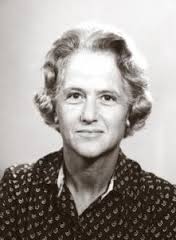
Source: http://um2017.org/faculty-history/sites/default/files/imagecache /small/Eisenstein,%20Elizabeth.jpg
Elizabeth Eisenstein’s life was dedicated to her historical writings on the development of movable type. Eisenstein’s most prominent work, “The Printing Press as an Agent of Change“ was published in 1979. Her work argues that the development of the printing press, specifically Johannes Gutenberg’s printing press, sparked significant developments throughout society. According to Eisenstein, the development of movable type created a cultural explosion through the dissemination of information in a quick manner. Eisenstein compared the development of the press to other landmark eras, including the Renaissance and Protestant Reformation. According to the Washington Post, Eisenstein referred to this time frame as the “communications revolution”. In addition to “The Printing Press as an Agent of Change“, Eisenstein wrote “Grub Street Abroad: Aspects of the French Cosmopolitan Press From the Age of Louis XIV to the French Revolution” in 1992. “Grub Street Abroad” focused on the development of the press and it’s influence leading up to the French Revolution.
Her works would develop a historical overview of the press from it’s conception. Her works also spoke to the social developments that occurred as a result of press transformation. As The New York Times states: “Professor Eisenstein argued that the development of movable type by Johannes Gutenberg in the mid-15th century helped inaugurate a set of sweeping social changes thanks to the authoritative, widely tangible dissemination of information it allowed”. For her work she received an American Historical Association award in 2003, as well as the Gutenberg Award in 2012.
Eisenstein grew up in a well-to-do family, attending Vasarr college for her undergrad and earned doctoral degrees from Harvard. She additionally taught at American University in Washington, D.C. After her work at American University, Eisenstein began working at the University of Michigan where she taught history. She would remain a faculty member of the University of Michigan until her retirement in 1988.Elizabeth Eisenstein died on Jan. 31 at the age of 92. Although she is gone, her works are studied throughout the world and observed as some of the best works reciting the historical development of the printing press.

Leave a response